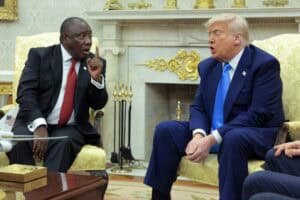Cyril Ramaphosa’s appeasement of anti-GNU factions threatens reforms needed to save South Africa from political and economic stagnation.

South Africans have a great deal of emotional energy invested in the government of national unity (GNU).
However, unless the GNU chalks up real successes, it will collapse in recriminations or potentially be subsumed in an explosion of populist anger.
That largely relies on the ANC reconciling itself to the concessional nature of coalition politics and moving away from mummified ideological fixations.
The ANC’s January 8th statement, which outlines its strategies for the coming year, afford no comfort.
There was no attempt by president Cyril Ramaphosa to hammer home the need for dramatic actions that, in turn, would require substantial policy rethinks.
ALSO READ: This is Ramaphosa’s year of high-stakes events
Attaining the national democratic revolution, said Ramaphosa, had been thwarted by the setback of an “unfavourable electoral performance”, which forced the “tactical” expedience of the GNU with “anti-transformation forces”.
CR cheerily pointed out that this was fortunately a “short-term initiative to secure space for the revolution to regain momentum”.
The State of the Nation Address, where the president outlines the government’s key policy objectives for the year, takes place on 6 February.
Expect much of the same mythologising which never translates into action.
Anti-GNU hardliners, including Gauteng premier Panyaza Lesufi and Health Minister Aaron Motsoaledi – both of whom are positioning themselves as contenders to unseat Ramaphosa at the 2027 elective conference – have been emboldened by their president’s words.
ALSO READ: Optimistic SA team from government and business heading to WEF in Davos
This week, Lesufi took aim at the Independent Examinations Board (IEB) exams that matrics at private schools write.
The remedy for the enormous disparity in quality between the highly coveted education provided by these independent schools – most of which, contrary to popular belief, are black and not particularly wealthy – and a state sector that mostly matriculates kids who lack in literacy and numeracy, is to scrap the IEB exam in favour of a state-run National Senior Certificate (NSC) one, he said.
His thinking presumably is that with the distinguishing certification abolished, parents will be willing to settle for mediocre, underresourced state schools instead of moving heaven and earth to get a private education. Lesufi is naive.
Instead of choosing the IEB matriculant above the NSC one, they’ll simply now do so based on what school the applicant attended.
National Health Insurance (NHI) is a far more difficult one for Ramaphosa. While a higher percentage of whites, Indians and coloureds are members of medical schemes, the absolute number of African members is greater.
ALSO READ: AfriForum, Solidarity give Gwarube and Ramaphosa 10 days to resolve Bela Act dispute
So there is a large black voting bloc, including all public servants, that is perceptibly growing restless at the prospect of losing access to superb private health care.
A potential compromise, first mooted by the Hospital Association, was that medical scheme membership should be compulsory for all employees, with the costs largely borne by the employers.
The NHI would then compete with medical schemes to provide cheaper medical insurance.
It remains to be seen whether Cyril can softshoe-shuffle his way out of this one. Endless conciliation of the anti-GNU leftists can’t go on forever because it means that the changes necessary to save South Africa won’t happen.
So, the moment is fast approaching when he will have to take a stand and cow – or lose – either his hardliners or the DA.
NOW READ: Ramaphosa chairs inaugural meeting of Presidential Economic Advisory Council
Support Local Journalism
Add The Citizen as a Preferred Source on Google and follow us on Google News to see more of our trusted reporting in Google News and Top Stories.






